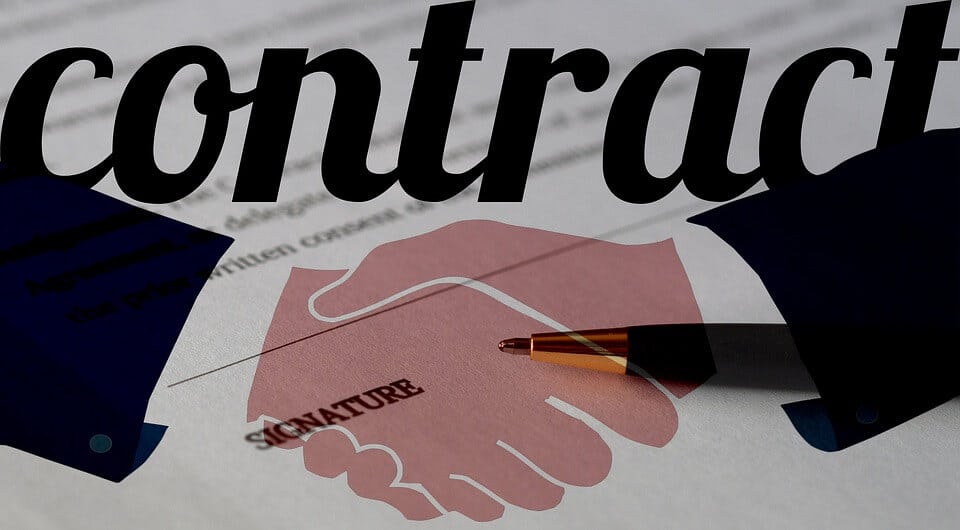

Experienced musicians will know and understand the importance of using contracts when dealing with promoters and music venues. Whilst the majority of those who organise gigs are trustworthy (or at least mean well!) some are not as they seem and are more than willing to tell a few lies to get what they want.
Without a legally binding contract bands can be deceived into performing for free. This can sometimes happen even if a promoter has verbally agreed to pay.

Whilst verbal contracts are (in many cases) equally as valid as written contracts, problems arise when one attempts to overcome the burden of proof.
“Many people are not aware that verbal agreements are in many cases as legally binding as written contracts. Verbal contracts can be upheld by a court if someone decides to breach the agreement, although without written terms and conditions it may be difficult to prove.”
Contractsandagreements.co.uk
That said, the best idea is to have the promoter and the band sign a contract stipulating the agreements that have been made.
Most musicians find the best way to arrange gigs is via email. At lest then, even if you don’t end up signing a contract, you have a written account of what was agreed.

A well-written contract should include the names and addresses of both parties, performance time, date and, most importantly, the agreed fee and when it shall be paid to the band.
Many bands feel that they have no choice but to rely on the word of a promoter, hoping they will receive the agreed amount at the end of the night.
Most small venues and promoters choose not to bother with contracts as they see it as extra work, and may even choose not to book bands who insist on using contracts.
If you’re looking for advice on taking payment as a band, check out this LMM blog post.Despite this, it’s crucial that musicians insist on a contract to hold promoters and music venues to account should anything go wrong.
The easiest way to create a contract for a live event is to use the Last Minute Musicians contract creation tool. It’s completely free and super easy to use.
The Musicians Union offers standard contracts for musicians that can cover both teaching and live performance. Read the MU’s advice on contracts for live shows on their Fees and Payments page.
You can use these contracts as a template, adding in your own additional information and customising them to suit your circumstance.
The MU will also offer legal advice for any of its members with contract disputes. Contact your local office for more information.

The contract doesn’t need to be a long multi-page document, but simply a clear and concise document expressing the essential components of the agreement.
The contract should stipulate how long the performance will run for to the most precise degree.
For example instead of ‘the performance will run for about two hours’ a contract should be specific, for example ‘the performance will run from 21.30 – 23.30’.
A pro forma invoice is delivered to a buyer in special circumstances – typically, when all details for the invoice are not yet known.
Reviso.com
What constitutes a Pro Forma invoice can vary, but they are generally considered to be a preliminary document stating all the details of a transaction in one place, that can be sent over in advance of the services being rendered.
For example, if you are yet to perform a show for a large corporate client, you may send over a pro forma invoice in order for it to clear the accounts department in time for the show. They can also be used in quoting or for customs purposes.
Unavoidable things can happen. Whether it’s a band member who can’t play the show or broken down transport, there may be a reason why the show must be cancelled… sometimes at short notice!
Cancellation terms need to be agreed by both parties and should be as fair as possible for both sides.

Whether it be extra money for travel costs, perhaps borrowed breakables from the promoter or a strict no swearing rule or specific curfew, unique aspects of a gig need to be indicated in a contract.
However small or insignificant, anything that may void the terms of the gig needs to be included in the contract. It’s critical that nobody is left assuming anything.
When a contract is broken, the first thing you should do is try to clear up what’s going on with the other party.
Always try and deal with things by email, as then you have a written record of what is arranged and when.
Should that prove fruitless, take legal advice and proceed accordingly.
You can find lists of “Blacklisted” promoters by searching Facebook groups, just make sure to review the evidence condemning them before immediately turning anything down!
If you’re a function or wedding band, then there is a good chance that you’re working with at least one entertainment agent.
They will generally have their own live contracts for both acts and clients to sign, but it’s important to review these carefully to double check for any mistakes or anything you aren’t okay with.
If you receive any contracts you aren’t entirely happy about, raise your concerns with the agency. You can also have them looked over by a legal professional or the Musicians’ Union.
Have you got any gigging horror stories? Perhaps you have a technique that ensures you get paid every time? Let us know in the comments below!